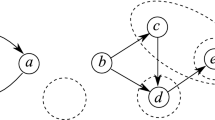Abstract
We provide a syntactic model of unawareness. By introducing multiple knowledge modalities, one for each sub-language, we specifically model agents whose only mistake in reasoning (other than their unawareness) is to underestimate the knowledge of more aware agents. We show that the model is a complete and sound axiomatization of the set-theoretic model of Galanis (University of Southampton Discussion paper 709, 2007) and compare it with other unawareness models in the literature.
Similar content being viewed by others
References
Aumann R. J. (1999) Interactive epistemology i: Knowledge. International Journal of Game Theory 28: 263–300
Board, O., & Chung, K. S. (2007). Object-based unawareness. mimeo, University of Pittsburgh.
Chellas B. F. (1980) Modal logic: An introduction. Cambridge University Press, Cambridge
Čopič, J., & Galeotti, A. (2007). Awareness equilibrium. Mimeo, University of Essex.
Chen, Y. C., Ely, J., & Luo, X. (2009). Note on unawareness: Negative introspection vs. AU introspection (and KU introspection), mimeo.
Dekel E., Lipman B., Rustichini A. (1998) Standard state spaces preclude unawareness. Econometrica 66: 159–173
Ewerhart, C. (2001). Heterogeneous awareness and the possibility of agreement. mimeo.
Fagin R., Halpern J. Y. (1988) Belief, awareness, and limited reasoning. Artificial Intelligence 34: 39–76
Fagin R., Halpern J. Y., Moses Y., Vardi M. Y. (1995) Reasoning about knowledge. MIT Press, Cambridge, MA
Feinberg, Y. (2004). Subjective reasoning—games with unawareness. Discussion Paper #1875, Stanford University.
Feinberg, Y. (2005). Games with incomplete unawareness. Discussion Paper #1894, Stanford University.
Filiz-Ozbay, E. (2008). Incorporating unawareness into contract theory. Mimeo, University of Maryland.
Galanis, S. (2007). Unawareness of theorems. University of Southampton, Discussion Papers in Economics and Econometrics 709.
Galanis, S. (2008). Trade and the value of information under unawareness, mimeo.
Geanakoplos, J. (1989). Game theory without partitions, and applications to speculation and consensus. Cowles Foundation Discussion Paper No. 914.
Halpern J. Y. (2001) Alternative semantics for unawareness. Games and Economic Behavior 37: 321–339
Halpern, J. Y., & Rêgo, L. C. (2006). Extensive games with possibly unaware players. In: Proceedings of the Fifth International Joint Conference on Autonomous Agents and Multiagent Systems, pp. 744–751.
Halpern J. Y., Rêgo L. C. (2008) Interactive unawareness revisited. Games and Economic Behavior 62: 232–262
Heifetz A., Meier M., Schipper B. C. (2006) Interactive unawareness. Journal of Economic Theory 130: 78–94
Heifetz, A., Meier, M., & Schipper, B. C. (2007). Unawareness, beliefs, and games. The University of California, Davis, Mimeo.
Heifetz A., Meier M., Schipper B. C. (2008a) A canonical model of interactive unawareness. Games and Economic Behavior 62: 232–262
Heifetz, A., Meier, M., & Schipper, B. C. (2008b). Dynamic unawareness and rationalizable behavior, mimeo.
Li, J. (2006). Dynamic games of complete information with unawareness. Mimeo, University of Pennsylvania.
Li J. (2009) Information structures with unawareness. Journal of Economic Theory 144: 977–993
Modica S., Rustichini A. (1994) Awareness and partitional information structures. Theory and Decision 37: 107–124
Modica S., Rustichini A. (1999) Unawareness and partitional information structures. Games and Economic Behavior 27: 265–298
Modica S., Rustichini A., Tallon J. M. (1998) Unawareness and bankruptcy: A general equilibrium model. Economic Theory 12: 259–292
Ozbay, E. (2008). Unawareness and strategic announcements in games with uncertainty. Mimeo, University of Maryland.
Sadzik, T. (2006). Knowledge, awareness and probabilistic beliefs. mimeo, Graduate School of Business, Stanford University.
von Thadden, E. L., & Zhao, X. J. (2008). Incentives for unaware agents. mimeo, University of Mannheim.
Xiong, S. (2007). A revisit of unawareness and the standard state space. mimeo, Northestern University.
Zhao X. J. (2008) Moral hazard with unawareness. Rationality and Society 20: 471–496
Author information
Authors and Affiliations
Corresponding author
Rights and permissions
About this article
Cite this article
Galanis, S. Syntactic foundations for unawareness of theorems. Theory Decis 71, 593–614 (2011). https://doi.org/10.1007/s11238-010-9218-3
Published:
Issue Date:
DOI: https://doi.org/10.1007/s11238-010-9218-3



